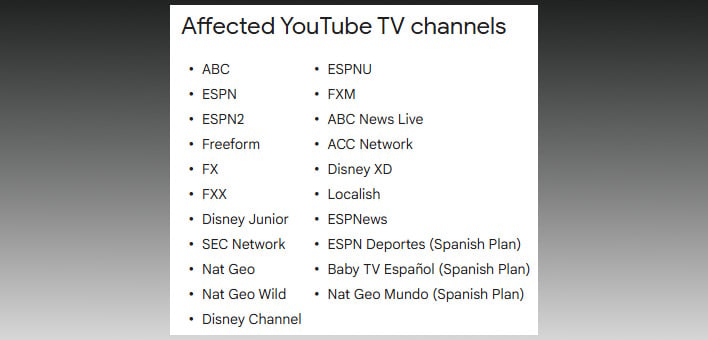For the time being, millions of YouTube TV subscribers are no longer able to access Disney-owned channels, including ESPN, ESPN2, ABC, National Geographic, FX, and a whole bunch more. The timing couldn't be worse, either, with various professional and college sports seasons now in full swing. This effectively means that YouTube TV subscribers will need to make alternative plans to continue catching games that air on ESPN and ABC.
As a new YouTube TV subscriber myself, I find this especially frustrating. I made the leap ahead of the NBA and NFL seasons after having been a DirecTV satellite TV subscriber for decades. But as is prone to happen on cable, satellite, and streaming TV services, subscribers get caught in the crosshairs of contract disputes between service providers and channel owners.
That's the case here, with Google claiming in a YouTube TV blog post that Disney is playing dirty pool to get its way in contract negotiations.
"Last week Disney used the threat of a blackout on YouTube TV as a negotiating tactic to force deal terms that would raise prices on our customers. They’re now following through on that threat, suspending their content on YouTube TV. This decision directly harms our subscribers while benefiting their own live TV products, including Hulu + Live TV and Fubo," Google states in a YouTube TV blog post.
 Here is every Disney-owned channel that YouTube TV subscribers can no longer access.
Here is every Disney-owned channel that YouTube TV subscribers can no longer access.
To be clear, I'm not pinning the blame solely on Google. Disney is culpable too. However, what adds to the frustration is that Google began the 2025 calendar year with a $10 price increase to its base YouTube TV package, bringing the cost to $82.99 per month (after having also
raised the price in mid-2023). That's before any add-ons or supplemental features. For example, there's a 4K Plus option for an additional $9.99 per month that unlocks 4K viewing, unlimited concurrent streams at home, and offline viewing of DVR recordings on mobile devices.
The sad reality is that cutting the cord is no longer the
value play that it once was, and it's because there is so much fragmentation in the streaming space. However, it's not unreasonable to expect providers and channel owner to work out their contract disputes without agitating subscribers with blackouts. To put it into perspective, Disney raked in $91.36 billion in revenue last year, and Google collected $350 billion.
Naturally, Disney disagrees with Google's assessment of the situation, and says the search giant is actually at fault for the situation. From Disney's vantage point, Google is abusing its dominant position in the market to strong arm the competition.
"Unfortunately, Google’s YouTube TV has chosen to deny their subscribers the content they value most by refusing to pay fair rates for our channels, including ESPN and ABC," Disney said in a statement provided to multiple outlets. "Without a new agreement in place, their subscribers will not have access to our programming, which includes the best lineup in live sports – anchored by the NFL, NBA, and college football, with 13 of the top 25 college teams playing this weekend. With a $3 trillion market cap, Google is using its market dominance to eliminate competition and undercut the industry-standard terms we’ve successfully negotiated with every other distributor."
It's a he said, she said situation, as it always is when these things happen (DirecTV wasn't immune to blackouts stemming from contract negotiations, either).
In a
blog post, Google contends it's "working in good faith" with Disney to work out a deal. My crystal ball says it will eventually happen, as it's in the best interest of both Disney and Google to get this sorted out. However long it takes is anyone's guess. If it goes on for an "extended period of time," however, Google says it will offer subscribers a $20 credit (presumably a one-time credit). Gee, thanks.

